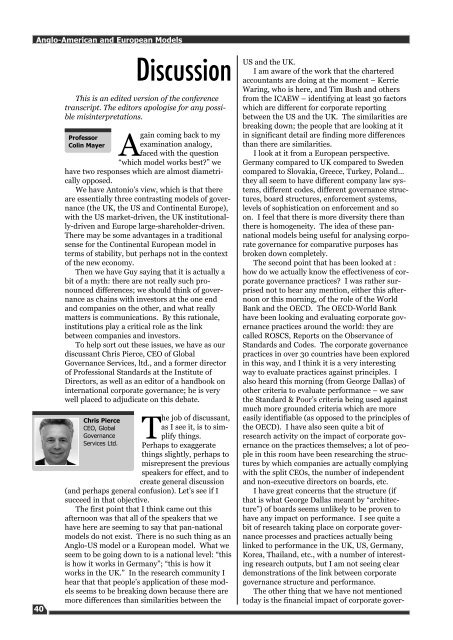to download a Special Report of this meeting - The Europaeum
to download a Special Report of this meeting - The Europaeum
to download a Special Report of this meeting - The Europaeum
You also want an ePaper? Increase the reach of your titles
YUMPU automatically turns print PDFs into web optimized ePapers that Google loves.
Anglo-American and European Models<br />
40<br />
Discussion<br />
This is an edited version <strong>of</strong> the conference<br />
transcript. <strong>The</strong> edi<strong>to</strong>rs apologise for any possible<br />
misinterpretations.<br />
Pr<strong>of</strong>essor<br />
Colin Mayer<br />
Again coming back <strong>to</strong> my<br />
examination analogy,<br />
faced with the question<br />
“which model works best” we<br />
have two responses which are almost diametrically<br />
opposed.<br />
We have An<strong>to</strong>nio’s view, which is that there<br />
are essentially three contrasting models <strong>of</strong> governance<br />
(the UK, the US and Continental Europe),<br />
with the US market-driven, the UK institutionally-driven<br />
and Europe large-shareholder-driven.<br />
<strong>The</strong>re may be some advantages in a traditional<br />
sense for the Continental European model in<br />
terms <strong>of</strong> stability, but perhaps not in the context<br />
<strong>of</strong> the new economy.<br />
<strong>The</strong>n we have Guy saying that it is actually a<br />
bit <strong>of</strong> a myth: there are not really such pronounced<br />
differences; we should think <strong>of</strong> governance<br />
as chains with inves<strong>to</strong>rs at the one end<br />
and companies on the other, and what really<br />
matters is communications. By <strong>this</strong> rationale,<br />
institutions play a critical role as the link<br />
between companies and inves<strong>to</strong>rs.<br />
To help sort out these issues, we have as our<br />
discussant Chris Pierce, CEO <strong>of</strong> Global<br />
Governance Services, ltd., and a former direc<strong>to</strong>r<br />
<strong>of</strong> Pr<strong>of</strong>essional Standards at the Institute <strong>of</strong><br />
Direc<strong>to</strong>rs, as well as an edi<strong>to</strong>r <strong>of</strong> a handbook on<br />
international corporate governance; he is very<br />
well placed <strong>to</strong> adjudicate on <strong>this</strong> debate.<br />
Chris Pierce<br />
CEO, Global<br />
Governance<br />
Services Ltd.<br />
<strong>The</strong> job <strong>of</strong> discussant,<br />
as I see it, is <strong>to</strong> simplify<br />
things.<br />
Perhaps <strong>to</strong> exaggerate<br />
things slightly, perhaps <strong>to</strong><br />
misrepresent the previous<br />
speakers for effect, and <strong>to</strong><br />
create general discussion<br />
(and perhaps general confusion). Let’s see if I<br />
succeed in that objective.<br />
<strong>The</strong> first point that I think came out <strong>this</strong><br />
afternoon was that all <strong>of</strong> the speakers that we<br />
have here are seeming <strong>to</strong> say that pan-national<br />
models do not exist. <strong>The</strong>re is no such thing as an<br />
Anglo-US model or a European model. What we<br />
seem <strong>to</strong> be going down <strong>to</strong> is a national level: “<strong>this</strong><br />
is how it works in Germany”; “<strong>this</strong> is how it<br />
works in the UK.” In the research community I<br />
hear that that people’s application <strong>of</strong> these models<br />
seems <strong>to</strong> be breaking down because there are<br />
more differences than similarities between the<br />
US and the UK.<br />
I am aware <strong>of</strong> the work that the chartered<br />
accountants are doing at the moment – Kerrie<br />
Waring, who is here, and Tim Bush and others<br />
from the ICAEW – identifying at least 30 fac<strong>to</strong>rs<br />
which are different for corporate reporting<br />
between the US and the UK. <strong>The</strong> similarities are<br />
breaking down; the people that are looking at it<br />
in significant detail are finding more differences<br />
than there are similarities.<br />
I look at it from a European perspective.<br />
Germany compared <strong>to</strong> UK compared <strong>to</strong> Sweden<br />
compared <strong>to</strong> Slovakia, Greece, Turkey, Poland…<br />
they all seem <strong>to</strong> have different company law systems,<br />
different codes, different governance structures,<br />
board structures, enforcement systems,<br />
levels <strong>of</strong> sophistication on enforcement and so<br />
on. I feel that there is more diversity there than<br />
there is homogeneity. <strong>The</strong> idea <strong>of</strong> these pannational<br />
models being useful for analysing corporate<br />
governance for comparative purposes has<br />
broken down completely.<br />
<strong>The</strong> second point that has been looked at :<br />
how do we actually know the effectiveness <strong>of</strong> corporate<br />
governance practices I was rather surprised<br />
not <strong>to</strong> hear any mention, either <strong>this</strong> afternoon<br />
or <strong>this</strong> morning, <strong>of</strong> the role <strong>of</strong> the World<br />
Bank and the OECD. <strong>The</strong> OECD-World Bank<br />
have been looking and evaluating corporate governance<br />
practices around the world: they are<br />
called ROSCS, <strong>Report</strong>s on the Observance <strong>of</strong><br />
Standards and Codes. <strong>The</strong> corporate governance<br />
practices in over 30 countries have been explored<br />
in <strong>this</strong> way, and I think it is a very interesting<br />
way <strong>to</strong> evaluate practices against principles. I<br />
also heard <strong>this</strong> morning (from George Dallas) <strong>of</strong><br />
other criteria <strong>to</strong> evaluate performance – we saw<br />
the Standard & Poor’s criteria being used against<br />
much more grounded criteria which are more<br />
easily identifiable (as opposed <strong>to</strong> the principles <strong>of</strong><br />
the OECD). I have also seen quite a bit <strong>of</strong><br />
research activity on the impact <strong>of</strong> corporate governance<br />
on the practices themselves; a lot <strong>of</strong> people<br />
in <strong>this</strong> room have been researching the structures<br />
by which companies are actually complying<br />
with the split CEOs, the number <strong>of</strong> independent<br />
and non-executive direc<strong>to</strong>rs on boards, etc.<br />
I have great concerns that the structure (if<br />
that is what George Dallas meant by “architecture”)<br />
<strong>of</strong> boards seems unlikely <strong>to</strong> be proven <strong>to</strong><br />
have any impact on performance. I see quite a<br />
bit <strong>of</strong> research taking place on corporate governance<br />
processes and practices actually being<br />
linked <strong>to</strong> performance in the UK, US, Germany,<br />
Korea, Thailand, etc., with a number <strong>of</strong> interesting<br />
research outputs, but I am not seeing clear<br />
demonstrations <strong>of</strong> the link between corporate<br />
governance structure and performance.<br />
<strong>The</strong> other thing that we have not mentioned<br />
<strong>to</strong>day is the financial impact <strong>of</strong> corporate gover-
















